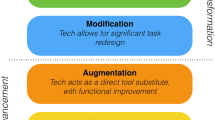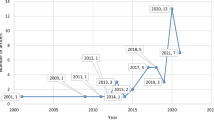Abstract
This paper examines relationships between learning and technological change and argues that we urgently need new ways to approach what it means to learn in the context of a global Fourth Industrial Revolution. It briefly introduces the postdigital perspective, which considers the digital ‘revolution’ as something that has already happened and focuses to its reconfiguration. It claims that what we access, how we access it, what we do with it, and who then accesses what we have done, are important elements of a postdigital world worthy of closer examination. Focusing to recent debates about postdigital collective intelligence, we develop the concept of postdigital we-learn by showing that it might help us, amongst other things, to counter the idea of a lone human accessing education primarily for future individual, economic profit, as prescribed by the neoliberal learning economy. Building on new schools of thought emerging in response to the expansion of non-human (algorithmic) agency, we refine the concept of postdigital we-learn as a gathering between humans and machines. The consequences of this gathering are uncomfortable, as they imply unlearning elements of both capitalism and critical pedagogy. However, such unlearning is inherent to ‘a critical pedagogy of becoming’ and positions postdigital we-learn as a suitable framework for understanding and development of emancipatory, critical learning in our postdigital reality.
Similar content being viewed by others
Notes
References
Barron, C. 2003. A strong distinction between humans and non-humans is no longer required for research purposes: A debate between Bruno Latour and Steve Fuller. History of the Human Sciences 16 (2): 77–99.
Biesta, G. 2006. What’s the point of lifelong learning if lifelong learning has no point? On the democratic deficit of policies for lifelong learning. European Educational Research Journal 5 (3–4): 169–180. https://doi.org/10.2304/eerj.2006.5.3.169.
Clark, A. 2003. Natural-born cyborgs: Minds, technologies, and the future of human intelligence. Oxford: Oxford University Press.
Cramer, F. 2013. Post-digital aesthetics. Lemagazine, 1 May. http://lemagazine.jeudepaume.org/2013/05/florian-cramer-post-digital-aesthetics/. Accessed 10 Sep 2019.
Eubanks, V. 2018. Automating Inequality. How high-tech tools profile, police, and punish the poor. New York: St. Martin’s Press.
Feenberg, A. 2002. Transforming technology: A critical theory revisited. New York: Oxford University Press.
Ford, D.R. 2016. Communist study: Education for the commons. Lanham: Lexington Books.
Ford, D.R. 2017. Education and the production of space: Political pedagogy, geography, and urban revolution. New York: Routledge.
Ford, D.R. 2020. A cybernautic anti-imperialist movement: In Defense of automated bots. Postdigital science and education. https://doi.org/10.1007/s42438-020-00106-7.
Freire, P. 1970. Cultural action and conscientization. Harvard Educational Review 40 (3): 452–477.
Fuller, S. 2019. Against academic rentiership: A radical critique of the knowledge economy. Postdigital Science and Education 1 (2): 335–356. https://doi.org/10.1007/s42438-019-00035-0.
Fuller, S., and P. Jandrić. 2019. The postdigital human: Making the history of the future. Postdigital Science and Education 1 (1): 190–217. https://doi.org/10.1007/s42438-018-0003-x.
Gibson, W. 1984. Neuromancer. New York: Ace Books.
Hayes, S. 2018. Invisible labour: Do we need to reoccupy student engagement policy? Learning and Teaching 11 (1): 19–34.
Hayes, S. 2019a. The labour of words in higher education: Is it time to reoccupy policy?. Leiden: Brill.
Hayes, S. 2019b. ‘Employable posthumans’: Developing HE policies that strengthen human technological collaboration not separation. In Education and technological unemployment, ed. M.A. Peters, P. Jandrić, and A.J. Means. Berlin: Springer.
Hayes, S. 2020. Postdigital positionality: Developing powerful narratives for learning, teaching, research and policy in higher education. Leiden: Brill.
Jandrić, P. 2017. Learning in the age of digital reason. Rotterdam: Sense.
Jandrić, P. 2019. We-think, we-learn, we-act: The trialectic of postdigital collective intelligence. Postdigital Science and Education 1 (2): 257–279. https://doi.org/10.1007/s42438-019-00055-w.
Jandrić, P. 2020. Postdigital research measurement. Postdigital Science and Education. https://doi.org/10.1007/s42438-020-00105-8.
Jandrić, P., and S. Hayes. 2019. The postdigital challenge of redefining education from the margins. Learning, Media and Technology 44 (3): 381–393. https://doi.org/10.1080/17439884.2019.1585874.
Jandrić, P., J. Knox, T. Besley, T. Ryberg, J. Suoranta, and S. Hayes. 2018. Postdigital science and education. Educational Philosophy and Theory 50 (10): 893–899. https://doi.org/10.1080/00131857.2018.1454000.
Jandrić, P., T. Ryberg, J. Knox, N. Lacković, S. Hayes, J. Suoranta, M. Smith, A. Steketee, M.A. Peters, P. McLaren, D.R. Ford, G. Asher, C. McGregor, G. Stewart, B. Williamson, and A. Gibbons. 2019. Postdigital dialogue. Postdigital Science and Education 1 (1): 163–189. https://doi.org/10.1007/s42438-018-0011-x.
Jones, C. 2018. Experience and networked learning. In Networked learning: Reflections and challenges, ed. N. Bonderup Dohn, S. Cranmer, J.A. Sime, M. de Laat, and T. Ryberg, 39–56. Cham: Springer. https://doi.org/10.1007/978-3-319-74857-3_3.
Jones, C. 2019. Capital, neoliberalism and educational technology. Postdigital Science and Education 1 (2): 288–292. https://doi.org/10.1007/s42438-019-00042-1.
Jopling, M., and M. Johnson. 2019. Black country education insight report. Wolverhampton, UK: University of Wolverhampton. http://educationobservatory.co.uk/edobs/wp-content/uploads/2019/08/Black-country-Annual-Education-Insight-Report-Final.pdf. Accessed 10 Sep 2019.
Jump, P. 2019. UK Universities must do more on social mobility. Times Higher Education, 9 May. https://www.timeshighereducation.com/opinion/uk-universities-must-do-more-social-mobility. Accessed 10 Sep 2019.
Leach, M. 2018. The enemy within: Why the narrative about universities and students went so wrong. WONKHE, 9 March. https://wonkhe.com/blogs/the-enemy-within-why-the-narrative-about-universities-and-students-went-so-wrong/. Accessed 10 Sep 2019.
Lewis, T.E., and R. Kahn. 2010. Education out of bounds: Reimagining cultural studies for a posthuman age. New York: Palgrave.
Malott, C.S., and D.R. Ford. 2015. Marx, capital, and education. New York: Peter Lang.
Marx, K. 1987[1953]. Economic manuscripts of 1857–58 [Grundrisse, conclusion]. In Marx Engels collected works, vol. 29. New York: International Publishers.
Matthewman, S. 2011. Technology and social theory. Basingstoke: Palgrave.
Means, A. 2019. Adapting the Xanax generation: Meditations on catastrophic precarity and postdigital melancholia. Postdigital Science and Education. https://doi.org/10.1007/s42438-019-00070-x.
O’Keefe, C. 2017. Economizing education: Assessment algorithms and calculative agencies. E-Learning and Digital Media 14 (3): 123–137. https://doi.org/10.1177/2042753017732503.
Peters, M.A. 2015. Interview with Pierre A. Lévy, French philosopher of collective intelligence. Open Review of Educational Research 2 (1): 259–266. https://doi.org/10.1080/23265507.2015.1084477.
Peters, M.A., and P. Jandrić. 2019. AI, human evolution, and the speed of learning. In Artificial intelligence and inclusive education: Speculative futures and emerging practices, ed. J. Knox, Y. Wang, and M. Gallagher, 195–206. Berlin: Springer. https://doi.org/10.1007/978-981-13-8161-4_12.
Peters, M.A., P. Jandrić, and S. Hayes. 2019. The curious promise of educationalising technological unemployment: What can places of learning really do about the future of work? Educational Philosophy and Theory 51 (3): 242–254. https://doi.org/10.1080/00131857.2018.1439376.
Ritzer, G., P. Jandrić, and S. Hayes. 2018. Prosumer capitalism and its machines. Open Review of Educational Research 5 (1): 111–129. https://doi.org/10.1080/23265507.2018.1546124.
Säljö, R. 2002. My brain’s running slow today—The preference for “things ontologies” in research and everyday discourse on human thinking. Studies in Philosophy and Education 21: 389–405. https://doi.org/10.1023/A:1019834425526.
Wagner, P. 2012. Modernity: Understanding the present. Cambridge: Polity.
Williamson, B. 2019. Brain data: Scanning, scraping and sculpting the plastic learning brain through neurotechnology. Postdigital Science and Education 1 (2): 65–86. https://doi.org/10.1007/s42438-018-0008-5.
Author information
Authors and Affiliations
Corresponding author
Additional information
Publisher's Note
Springer Nature remains neutral with regard to jurisdictional claims in published maps and institutional affiliations.
Rights and permissions
About this article
Cite this article
Jandrić, P., Hayes, S. Postdigital We-Learn. Stud Philos Educ 39, 285–297 (2020). https://doi.org/10.1007/s11217-020-09711-2
Published:
Issue Date:
DOI: https://doi.org/10.1007/s11217-020-09711-2




